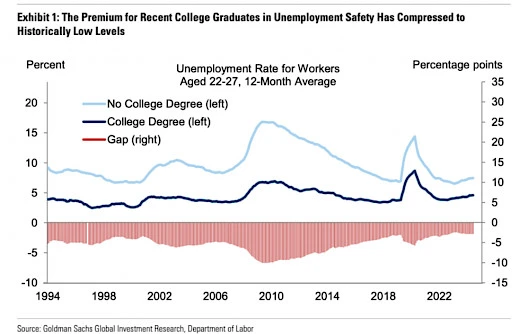The university degree is no longer valued by employers

A degree is no longer a guarantee of success: the labor market is changing.
For many years, higher education was seen as a “golden ticket” to stable employment and financial well-being. But a new analysis by Goldman Sachs sharply tempers this optimism: the job market for recent college graduates has declined so much that their advantage over peers without a degree has become minimal — the lowest in decades.
The team led by Chief Economist Jan Hatzius asked a direct question: is it really easier for graduates to find a job today? The answer is discouraging. Despite the overall healthy labor market, the situation for young professionals with degrees is far from ideal. The report raises an alarming signal — the so-called “security premium” from higher education is rapidly vanishing.
Graduates are losing their advantage
Whereas in the past, a degree reduced the risk of unemployment, that effect has now almost disappeared. In May 2025, the unemployment rate among college graduates aged 22–27 reached 3.8%, which is already above the normal rate for full employment. On an annual basis, the figure reached 4.6%. Most notably, the gap between graduates and non-graduates shrank to a symbolic -2.8 percentage points, down from -4.1. In other words, having a degree is no longer a significant shield against unemployment.
Job hunting no longer favors the educated
Historically, graduates found jobs faster than those who did not attend university. But in 2025, this difference is just 0.9 percentage points. For comparison: previously, the gap reached an impressive 8.3 points. This is not only due to the aftermath of the pandemic and recovery in low-skilled sectors, but also because “white-collar” industries — finance, IT, and business services — are currently reluctant to open new positions.
Labor force participation: worrying trends
While the unemployment gap is narrowing, labor force participation is diverging. Since the late 1990s, young people without degrees have become significantly less likely to enter the job market: minus seven percentage points, compared to minus two for college graduates.
Although more young people are studying and not working — which could be a good investment in the future — the number of those who have simply dropped out of working life without any clear reason has risen sharply, especially among those without higher education. In 30 years, their share has doubled. This points to a more troubling trend: more and more young people are losing faith in employment opportunities and are simply disappearing from the labor market radar.
You may also be interested in:
- The Sun shows the aftermath of a drone attack on the British Akrotiri base
- Cyprus court rejects appeals by three Chinese investors to restore residency permits
- Union Urges British Bases in Cyprus to Move Employees to Remote Work
- Cyprus Imposes Temporary Ban on Drone Usage
- Social Center in Mouttalos, Paphos, Temporarily Closed


